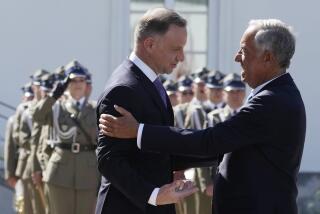Kazakh Chief Keeps U.S. Guessing on Arms Pact
- Share via
WASHINGTON — Five months after the Soviet Union’s collapse, the Bush Administration believes that a deal is finally in sight to put the former superpower’s giant nuclear arsenal under firm control of a single government--Boris N. Yeltsin’s Russia.
But every time agreement appears within reach, a last-minute problem arises.
The latest glitch came on Monday, when President Nursultan Nazarbayev of Kazakhstan arrived in Washington for talks with President Bush--and what officials hoped would be a triumphant announcement that his new country has agreed to eliminate all long-range nuclear weapons from its territory, leaving Russia the only nuclear power in the area.
That would mean success for a long diplomatic campaign by the Administration to persuade Russia’s three nuclear-equipped neighbors--Kazakhstan, Ukraine and Belarus--to give up their atomic weapons. And success would clear the way for the Senate to ratify the Strategic Arms Reduction Treaty (START), which Bush and then-Soviet President Mikhail S. Gorbachev signed in 1991.
However, in comments just before his departure from Moscow, Nazarbayev suddenly proposed that some nuclear missiles remain in Kazakhstan, but under Russian control. “The question of giving Kazakh territory for our common defense and for deployment of nuclear missiles will be decided on mutually advantageous grounds,” he told reporters in the Russian capital.
That isn’t what the United States thought Nazarbayev had agreed to--a complete elimination of nuclear weapons. One official gasped in surprise when he was handed a copy of the Kazakh president’s remarks.
Secretary of State James A. Baker III huddled with Nazarbayev on Monday afternoon at Blair House, the President’s guest residence. But the arms and other issues remained unresolved, and one official warned, “It isn’t all done yet.”
Bush and Baker want Nazarbayev to agree to a deal under which Kazakhstan would join the START treaty, promise to eliminate all its nuclear weapons by the decade’s end and embrace the 1968 Nuclear Non-Proliferation Treaty.
At a news conference Monday evening, Nazarbayev affirmed his intention to come to an agreement and said he is now prepared to sign a letter of obligation committing his country to the START treaty.
More to Read
Sign up for Essential California
The most important California stories and recommendations in your inbox every morning.
You may occasionally receive promotional content from the Los Angeles Times.














